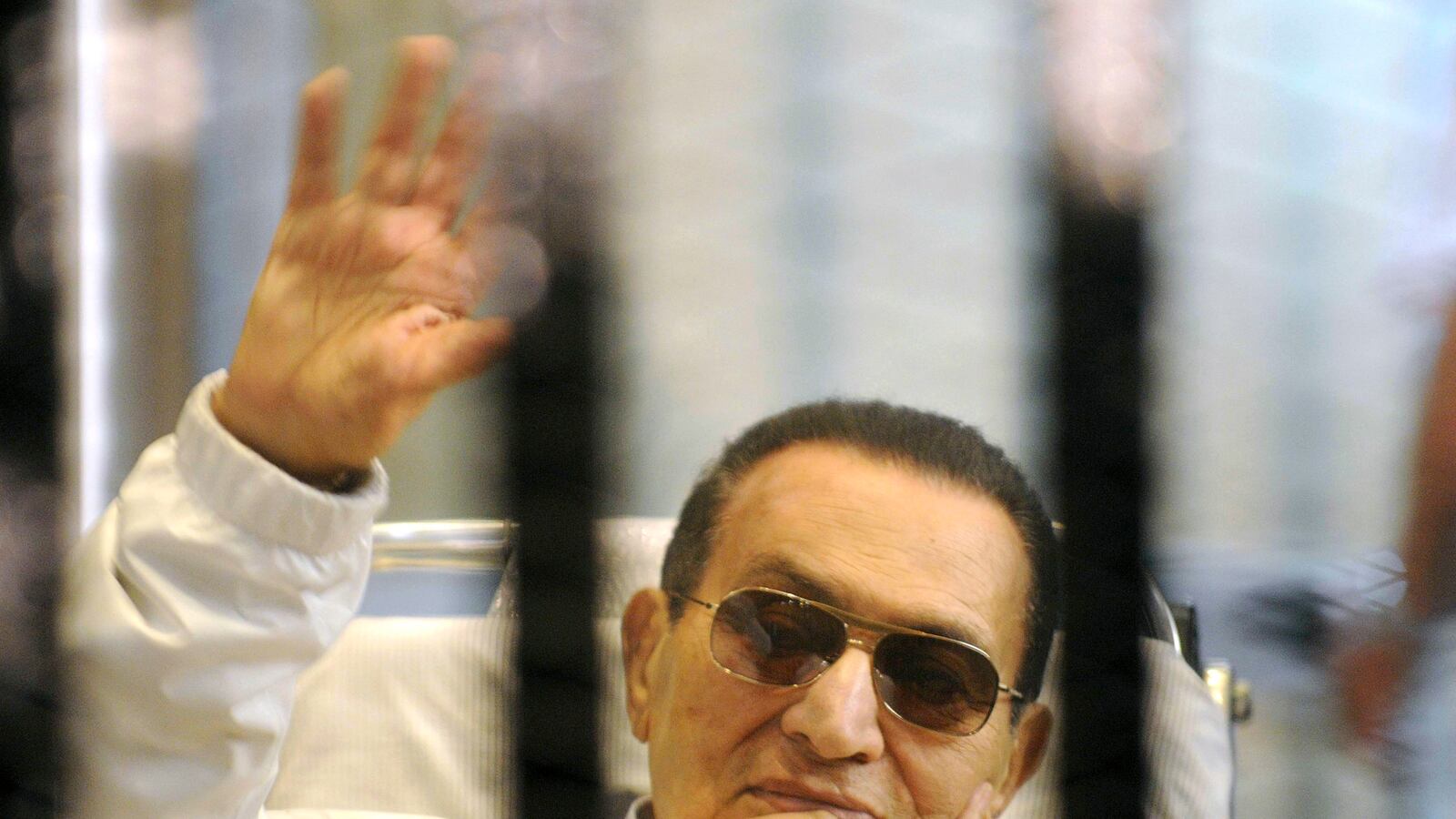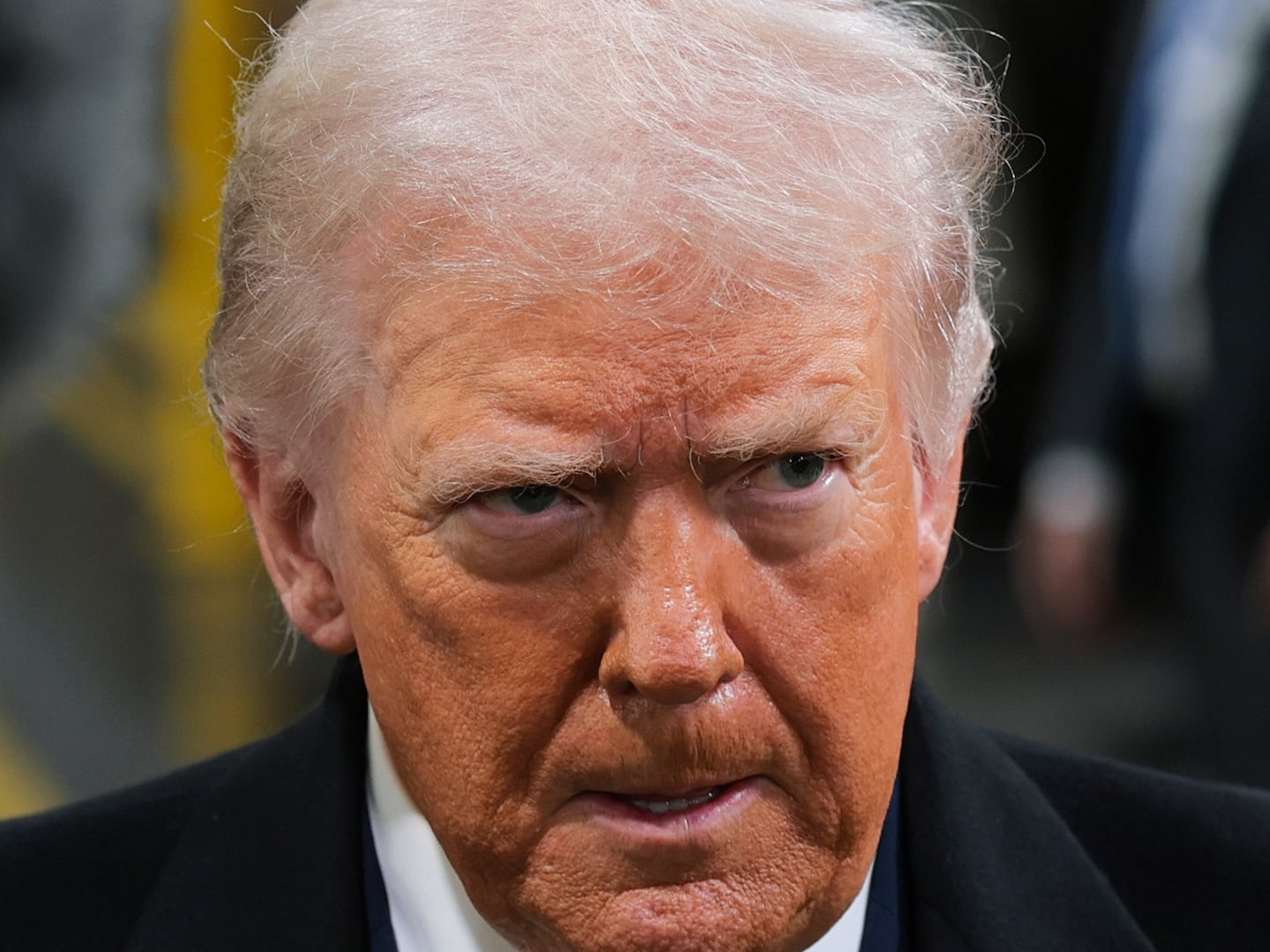When Hosni Mubarak, Egypt’s one-time autocrat, reappeared inside the metal defendant’s cage of a Cairo courthouse on Saturday, he did something that took observers by surprise: he smiled and waved.
Mubarak, 84, had last been seen in the same courthouse last June, when, after a trial that dragged on for nearly a year, he received a sentence of life in prison for failing to stop the deaths of hundreds of protesters killed by his security forces during the 2011 revolution that forced him from power. Then, the trial had been dominated by the spectacle of a long-time dictator called to account for his crimes—and Mubarak seemed to embody the fall from grace, laying stoic, ailing on a rolling hospital bed, with sunglasses over his eyes and his two sons often blocking him from view.

Now, with the conviction overturned and a retrial set to begin from square one, Mubarak was back following numerous reports that he had died or was “clinically dead,” as state news once claimed. And he was unexpectedly upbeat, smiling and waving at his supporters inside the courthouse, and appearing relaxed as he conversed with his son Gamal. Photos of the new-look Mubarak spread instantly on social media, and on Twitter, many commentators wondered whether he knew something they didn’t. Reporters at the scene, meanwhile, said the crowd of supporters that had gathered at the courthouse was optimistic that Mubarak might go free.
The building drama, though, was quickly cut short when the judge announced that he was recusing himself from the case, moving the trial to a different court and prolonging it indefinitely. The postponement was met by a brief scuffle between Mubarak supporters and opponents inside the courthouse—and exasperation among Egyptians hoping for closure.
Speculation over Mubarak’s fate, meanwhile, promises to continue, with the brief appearance by the former dictator only adding to the intrigue. “I’m wondering what was going through his head,” the Cairo activist who blogs under the handle Big Pharaoh tweeted after the trial was postponed.
Anti-Mubarak lawyers reacted positively to the news—the judge in question had controversially acquitted a slew of former Mubarak officials last fall in a trial over the revolution’s infamous “Battle of the Camels,” in which protesters in Cairo’s Tahrir Square were attacked by regime-loyal thugs, some of them riding camels. But the delay also compounded fears among Egyptians that justice remains a long way off for Mubarak and the former regime figures standing trial with him—and may never come at all. Mubarak is on trial alongside his former interior minister, who received the same sentence last June, as well as six former security officials. He is also facing charges of corruption, along with his sons Alaa and Gamal.
“[Mubarak] is probably going to spend the rest of his life in jail, but the important thing is people need to have a sense of justice so they get some closure,” said Aladdin Elaasar, a journalist and author of the book Last Pharaoh: Mubarak and the Uncertain Future. “If they see people who were corrupt and involved in torture get away with it, they won’t have trust in the legal system or in the state.”
According to Reuters, lawyers also said that the delay could allow prosecutors time to review evidence from a presidential fact-finding commission into protester deaths, which has not been made public. Anticipation had also been building since earlier this year when the Kuwaiti defense team that volunteered to defend Mubarak said it had “new evidence” that would prove Mubarak’s innocence.
Recent leaks from the presidential commission, which allege the military’s complicity in deaths and torture during the revolution, suggest that “there will be more explosive material to come out in the courtroom,” says Jane Kinninmont, a Middle East and North Africa specialist at Chatham House in London. “The new Egyptian authorities will face a balancing act between wanting to be seen to take on the old regime—especially as demonstrating the old system’s failings is a good way to encourage support for the transition—and not wanting to alienate the Army.”
Egypt's increasingly unstable political climate has overshadowed the trial, as Mubarak’s successor Mohamed Morsi comes under fire for implementing policies reminiscent of the old regime. Many critics also say the lack of reforms within the country’s institutions, most significantly the interior ministry, is hindering the legal process.
But Paul Sullivan of the National Defense University in Washington, D.C., expects Mubarak to remain behind bars for a long time to come. “If something prompts an acquittal there will be further charges pressed immediately,” he says. “My guess is his sentence could be much harsher or, more likely, the decision will be postponed for a long time and then again.”
With Vivian Salama.






